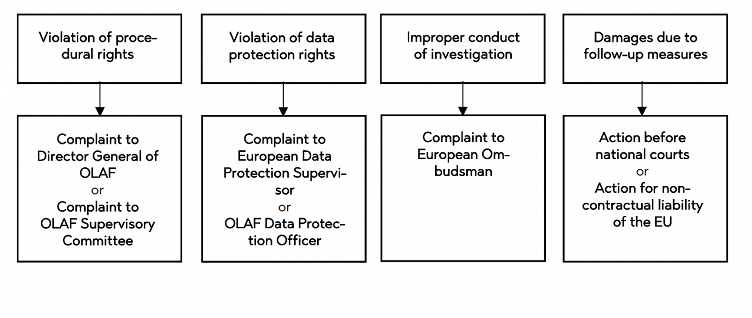Seeking Legal Recourse Against OLAF Investigations and Reports
Where OLAF investigations, and in particular OLAF reports, violate the rights of natural and legal persons, such as data protection rights or procedural guarantees, it is possible to submit complaints and take legal action against OLAF. Various possibilities exist at both European and national level:

Complaints to OLAF
Individuals affected by OLAF investigations can file a complaint directly to the Director General of OLAF. In 2018, the Director General received five complaints stating that OLAF failed to comply with the procedural rights of those under investigation. Affected individuals may also consider bringing a complaint to the OLAF Supervisory Committee. Making such a complaint does not preclude the complainant from filing complaints at other institutions such as to the European Data Protection Supervisor or to bring an action before national courts.
Complaint to Data Protection Supervisor/Officer
OLAF investigative activities fall under the legal framework of the data protection regulation for EU institutions and bodies (Regulation (EU) No. 2018/1725) Therefore OLAF is subject to the decisions and recommendations of the European Data Protection Supervisor. When in the course of an OLAF investigation personal data is processed, OLAF and its own Data Protection Officer are responsible for guaranteeing the rights of the people involve. These include the right to access, rectify and delete personal data and the right to limit the processing of such data.
For example, if personal data is gathered in excessive amounts or disclosed to third parties without consent, affected individuals can file a complaint to the European Data Protection Supervisor using the following complaint form. The complaint must be made within a period of two years from the date on which the affected individual became aware of the facts to which the complaint relates. The complaint is only admissible when the affected person has previously contacted OLAF and its Data Protection Officer.
Complaint to European Ombudsman
The European Ombudsman aims to ensure that EU institutions guarantee the transparency of the EU decision-making process, take responsibility for their decisions and respond to citizens’ requests for clarification. The latter includes guaranteeing public access to documents and information. In this way the Ombudsman ensures the highest ethical standards of EU staff in the performance of their duties. If OLAF’s conduct during investigative activities does not meet these standards, for instance in cases of unfair treatment, discrimination, failure to reply to enquiries or unnecessary delay in obtaining access to information, a complaint to the European Ombudsman can be made. As before, a complaint must be made within two years from the date on which the person concerned became aware of the facts on which the complaint is based. Similarly, the affected individual must have previously contacted OLAF in an attempt to resolve the matter.
Actions before National and European Courts
In addition to instigating complaint procedures, one can also bring actions before competent national courts against the measures taking by national authorities on the basis of an OLAF report.
Finally, it is also possible to bring an action before the* European General Court*. Such an action aims to establish the non-contractual liability of the EU for the damage caused by OLAF’s activities. According to settled case law of the European Court of Justice, a number of conditions need to be met in order to establish non-contractual liability and to successfully claim compensation for incurred damage. In particular, these conditions include (1) the unlawfulness of the behaviour of the institutions, (2) the existence of damage and (3) a causal link between the unlawful behaviour and the damage that occurred. If one of these conditions remains unfulfilled, the action is dismissed in its entirety.
For this reason, it is usually difficult for to successfully claim compensation for damage caused by OLAF’s activities. In 2019, the European General Court ruled in case T-631/16 that OLAF’s recommendations were not the direct source of the follow-up action taken by national authorities. Accordingly, the European General Court found that there was no causal link between OLAF’s behaviour and the damage incurred by the complainant. As discussed above, OLAF’s recommendations do not automatically lead to judicial proceedings. Rather, the competent national authorities are free to decide whether and what action to take after OLAF has published its report. The Court’s position can be viewed critically, because customs authorities generally comply with OLAF’s recommendation to pursue post-clearance recovery. If an action before the European General Court is unsuccessful, the only alternative is to seek legal recourse before national courts against the measures taking by national authorities on the basis of an OLAF report.
BLOMSTEIN advises you on all matters relating to OLAF investigations and in the field of foreign trade law. If you are affected by an OLAF investigation or an OLAF report and are in need of legal assistance, Roland M. Stein and Leonard von Rummel will be pleased to assist you at any time.